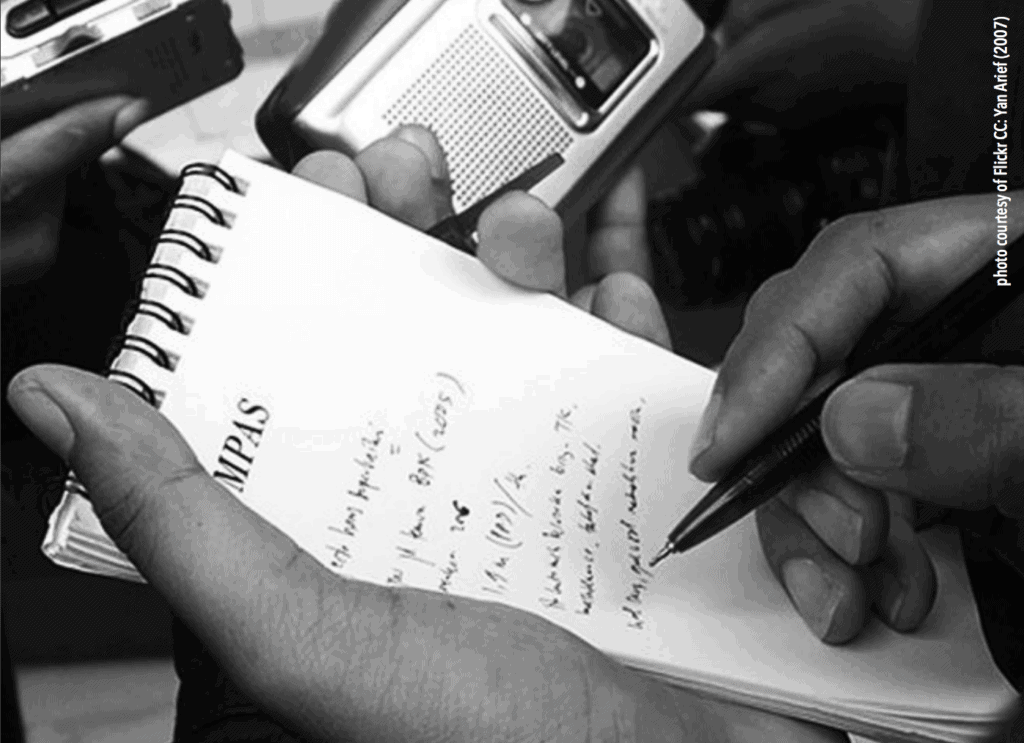Media and Trafficking in Human Beings Guidelines was authored by the Ethical Journalism Network as part of a project funded by the European Union and implemented by an international consortium led by the International Centre for Migration Policy Development (ICMPD). © 2017. Republished with permission.
GOOD PRACTICE: INTERVIEWING GUIDELINES
The tragedy of trafficking and slavery is newsworthy but because it is a hidden crime, it often takes an immense amount of resources to support investigative journalism. Access to survivors is sometimes difficult, and it is their voices that play a huge part in pushing a story into the mainstream.
 Photo courtesy of Flickr CC: Yan Arief (2007)
Photo courtesy of Flickr CC: Yan Arief (2007)
Remember: News media have great power. People can be flattered when they are approached by reporters, without understanding fully the risks to themselves and to others when they come into the public eye. This is particularly true of people caught up in the drama and tragedy of human trafficking as much as it applies to people involved in humanitarian disaster, war or other traumatic events.
Journalists need to be as transparent as possible in their relations with their sources and particularly the victims and survivors of human trafficking. Journalists should:
- Identify if someone is a minor. Under 18 or under the age of consent.
- Assess the vulnerability of sources (particularly young people, or people who have been the victims of trauma and violence);
- Respect privacy. Everyone has the right to privacy and to be treated with respect, but especially children;
- Ensure that children are interviewed in the presence of a responsible adult or guardian;
- Explain to them the reporting process and why the story is important;
- Avoid, except in the most extraordinary circumstances, the use of subterfuge or deception when reporting on trafficking issues.
Remember: If the victim has no parent or guardian, or is illiterate or can’t read, and if the responsible organisation representing the survivor is unethical and untrustworthy, a journalist has to rely upon their own conscience and ethical judgement. This is the moment, above all, to show the ethic of humanity.
Here is an additional checklist of questions that the ethical journalist will ask in interviewing someone who is a survivor of human trafficking:
- Have I clarified with them why I am making this interview and what is the aim of my story? Have I been fully transparent about my intentions?
- Have I taken care to protect them– for instance, if a young person or someone in vulnerable circumstances– to ensure that they are aware of the potential consequences of publication of the information they give?
- Am I confident that they fully understand the conditions of our interview, and what I mean by off-the-record, background and not-for-attribution, or other labels?
- If a source asks for conditions before agreeing to an interview, what are my limits? Should I pay for a source’s expenses related to an interview? What might be legitimate costs that could be paid?
- Would I agree to further support for the sources, such as legal representation, if there are problems arising from my reporting?
- Have I asked permission before taking pictures or making a video recording?
- Have I asked pertinent questions, avoided reliving traumatic experiences, and allowed the interviewee to speak freely?
- Have I focused on the positive aspects of the interviewee’s experience and did I clarify whether the interviewee can check my report for factual errors before publication?
- Have all the relevant questions been asked and answered? And have I been careful and sensitive and protected the interests of the interviewee?
Anonymity is a right which should be enjoyed by those who need it but is never granted routinely to anyone. When it comes to human trafficking, the protection of the most vulnerable people requires journalists to ensure that, whether they ask for it or not, anonymity should be considered for victims of abuse and those who may be at further risk if their identities are made known.
Should Journalists Break the Rules in the Name of Humanity?
Sometimes journalists may create relations with their sources that are ambiguous and can undermine the ethical base of their work. In 2014 Swedish broadcast journalist Fredrik Önnevall befriended a 15-year-old Syrian refugee when on assignment covering the migration crisis. He and his team decided to help the boy get to Sweden. The film they produced on the boy’s journey was broadcast on Swedish public television to widespread acclaim, but he was then prosecuted and convicted for people smuggling. His action prompted a fierce debate within journalism about the role of journalists in reporting – should they become participants in the story or remain solely observers?